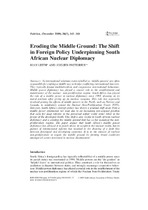Eroding the middle ground: the shift in foreign policy underpinning South African nuclear diplomacy
Abstract
In international relations states labelled as ‘middle powers’ are often
responsible for crafting a middle way to bridge conflicting international interests.
They typically favour multilateralism and cooperative international behaviour.
Middle power diplomacy has played a crucial role in the establishment and
maintenance of the nuclear non-proliferation regime. South Africa has played
the role of a middle power in nuclear diplomacy since 1994, drawing on its
moral position after giving up its nuclear weapons. This role has especially
involved joining the efforts of middle powers in the North, such as Norway and
Canada, to indefinitely extend the Nuclear Non-Proliferation Treaty (NPT).
However, South Africa’s foreign policy has shown a gradual shift away from a
middle power orientation not least due to an increasing non-aligned position
that calls for deep reforms to the perceived unfair world order tilted in the
favour of the developed North. This shift is also visible in South African nuclear
diplomacy and is eroding the middle ground that has so far sustained the nonproliferation
regime. The paper argues that South Africa’s middle power
diplomacy has allowed it to punch above its weight in the nuclear realm, but its
pursuit of international reforms has resulted in the drawing of a fault line
between developed and developing countries. It is in the interest of nuclear
non-proliferation to regain the middle ground by forming broad coalitions
amongst all actors interested in nuclear disarmament.

